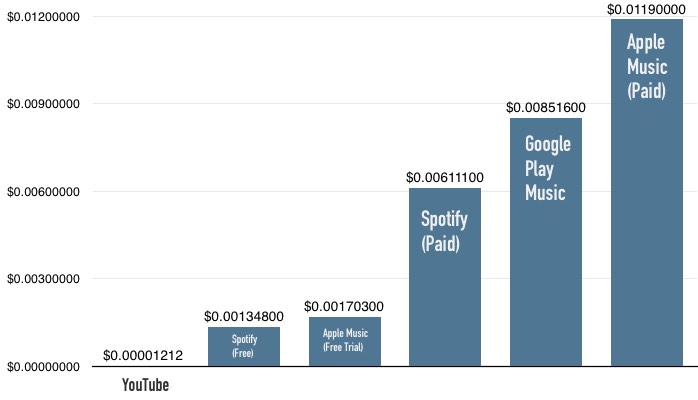Should music be free?
It’s a statement I’ve heard in comments on YouTube, debates with friends and heated arguments on Twitter and Facebook: music should be free. Things commonly go like this:
- Real music is art (and all art is free…right?)
- Why would I pay for music when there is so much free stuff available?
- Artists earn loads from streaming already, they don’t need album sales anymore.
- Music can downloaded for free from piracy sites anyway, so there’s no need to pay.
Is this just an attitude of entitlement where everything on the Internet is seen as ‘free’? Or is it recognition that the model has shifted whereby free media is so ubiquitous that musicians must support themselves without things like album sales now? And where does this leave music libraries like Instrumental Background Music who rely on licensing music to customers to survive?
The good old days
Throughout my childhood (I’m an 80’s guy), artists used to rely on record deals, album sales, royalty payouts from TV stations and events like concerts. While artists still rely on things like licensing deals and performances to bring in some cash, technology has disrupted the market to a point where buying music for general listening has potentially disappeared forever.
In Seth Godin’s book Tribes, he describes how the 5 pillars of the music industry have been falling for a while and argues that this, along with a lack of nurturing what he calls a ‘tribe’, is why the music industry is dying so quickly:
- Free promotion via radio
This is one of the few that continues to hold on due to things like online radio stations and using smartphones to stream radio even in cars, but as you’ll see below, streaming royalties isn’t making anyone rich. - Limited competition between music labels
Self-publishing has heavily disrupted this one. - Studio costs are prohibitive
Home studio setups are now two a penny, there is less and less need for expensive outboard gear to make music. - Focus on the Top 40 hits by the baby boomer generation
According to Godin this was an important way of maintaining control over the market as popular (pop) songs were discovered only when they were published in the Top 40. Nowadays, hits can be discovered by anyone due to the Internet and easier distribution, the labels have far less control over what is considered ‘popular’. - High margins on non-reproducible mediums like LP’s
Even though there has been a rise in LP sales over the last few years, the ease of free digital distribution has almost totally eliminated this bottleneck.
While a lot of musicians (myself included) have shouted and screamed about the loss of our livelihoods due to technological advances, I think we are actually clinging on to an antiquated vision of what the music industry is today. Album and track sales are pretty much dead in the water due to streaming, so it’s time to embrace a new model I believe.
The ‘free music’ argument

Before going any further, first we need to distinguish between the ‘types’ of music out there as when people talk about ‘free music’, they are generally referring to music for general listening purposes. Even though some artists choose to create music just for themselves, a lot of music is created purely for commercial reasons.
A fairly obvious example is that the tracks on Instrumental Background Music are for commercial usage like for videos explaining a service or product, monetised YouTube videos and podcasts etc. Even though some of the music here is written as ‘art’, the vast majority is written in a functional way and sold to filmmakers and the like as a tool so they can make money.
However, when we look at the general public who just want to listen to the music, the ‘free’ argument makes a lot of sense from a marketing perspective. I would love to connect with fans who like the music here and am even considering whether we should continue watermarking our preview downloads and get the whole catalogue up on streaming services for people to enjoy for free.
While researching for this article, I came across a plethora of opinions that were both pro and anti-piracy. Piracy goes hand-in-hand with the idea that music should be free as it fuels acceptance that the music has no value. However, it’s worth considering the argument that piracy helps musicians sell their music more by gaining them greater exposure rather than restricting them. This works only if track sales have a viable replacement for the loss of revenue (like streaming royalties or listeners investing in the artist somehow).
Streaming
A common argument I’ve come across is that music should be free because artists earn lots from streaming these days, get free exposure plus streaming is just like listening to a modern day radio anyway i.e. listening to radio has always been free.
However, radio is often supported by adverts and broadcasters pay out royalties to artists that feature on their radio station based on audience sizes, peak listening times etc. That’s changed with the likes of Spotify and Apple Music who offer on-demand streaming whereby you can remove ads if you pay a subscription fee and per-stream royalties are much lower.
But what kind of revenue does streaming actually generate? To give you an idea of how difficult making money from streaming is at the moment take a look at the chart below by Digital Music News which highlights the amount your average artist earns per stream:

If we consider that a superstar like Pharrell Williams earned $2,700 for 43 million plays of Happy on Pandora, it’s not difficult to see that your average musician isn’t riding around in a Lamborghini because of their 5,000 plays on Spotify last month.
But radio has always been a marketing platform for musicians and the likes of Spotify, Pandora & Tidal will primarily serve the same function (as will mobile devices which are increasingly being used as radio devices to stream music). But until streaming royalties reach decent levels such that they better support artists (if ever), it is about focusing on alternative revenue streams.
All that said, there is actually some light at the end of the tunnel with respect to streaming. As music subscriber counts pass the 100 million mark (beating Netflix) and Apple is reportedly going to increase royalties paid to artists, it could be argued that we’re just in a paradigm shift where the new record deals are being made directly with the distributors rather than the labels and that will lead to higher royalties. In an interview with ONErpm founder and CEO Emmanuel Zunz, subscriber levels could reach 500 million by 2019 which should mean artists will earn more as well.
Diversify or die

No one can doubt that the music industry is a tough one to survive in, but like every industry, it changes and musicians must adapt like in any business. Whether recreational music should be free or not is a bit of a moot point. It pretty much is at this point, so musicians have to learn to diversify their income streams to offset the loss of album sales, end of story.
But not only can free music be a great way to create a strong bond with your fans, it can also allow you to test the market which can be immensely powerful. It’s similar to how crowd funding has allowed anyone to experiment with market fit with their products and means you can hone in on what works or not with your audience which is invaluable.
On the other hand, there is no reason why businesses and individuals profiting from from the use of music shouldn’t pay for a license. If you were making a cake to sell, would you assume the ingredients you’re putting into your basket were free? Unless you’re a kleptomaniac, I’d expect the answer is no.
Focus on the experience
Some musicians may feel despondent about the state of things at the moment, but remember that people are still paying for music, it’s just that they are consuming music in a different format such as:
- Music events / concerts
- Live streaming performances through platforms like YouTube and Facebook
- Supporting artists via Patreon
- Helping pay album costs via crowd funding sites
- Buying vinyl and limited edition formats
- Purchasing merchandise direct (ok, that last one is not ‘officially’ music, but it is supporting the artist to make music)
It’s clear artists need to focus on creating experiences for their listeners through things like making videos and sharing their music in different formats. In fact, millennials prefer to spend more money on experiences than on material things according to some research by Harris Group and ‘Generation X’ shows no sign of doing things differently.
BYOB – Bring Your Own Business (or booze if you prefer)
Musicians need to act like a company and use content marketing to build a brand to survive these days. It’s about being entrepreneurial and experimenting with products and services however dry that might sound. Experimenting is something many musicians are good at doing with their music, but find it difficult in terms of business. However, I believe it’s the path one must take to survive in this industry.
And while it’s clear that new developments like streaming move us away from the old album sales model of earning, technologies like this also present new opportunities for artists to diversify their income streams.
Do you agree or disagree that music should be free? Share your thoughts below!
Cheers,
Cato
Please note, some blog posts may contain affiliate links to products. If you click on them and decide to buy the product, we earn a small commission which helps us support our work creating posts like this and videos etc. Thank you for your support!



Let us know what you're thinking